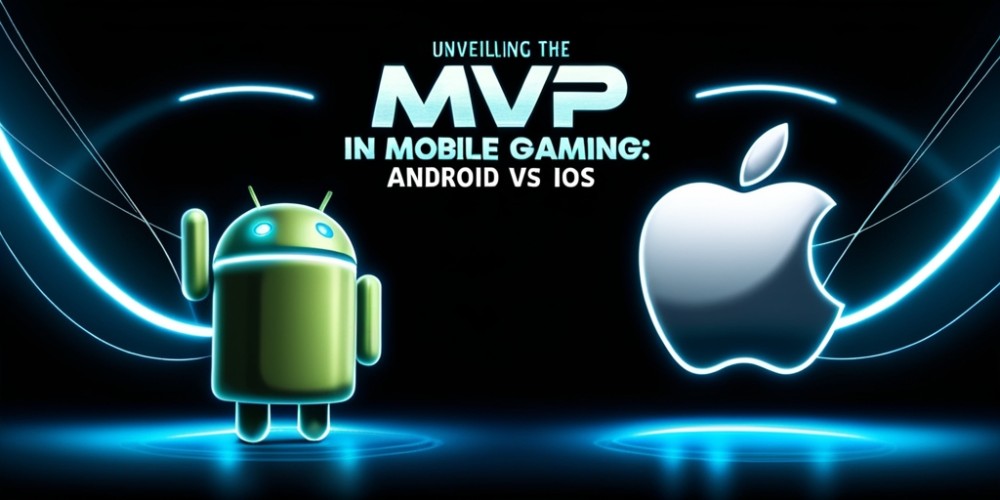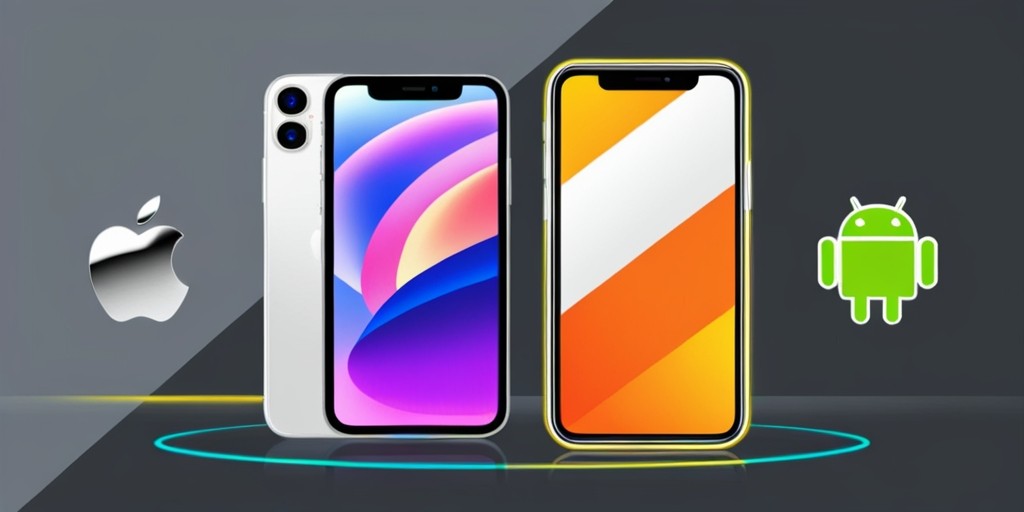Unveiling the MVP in Mobile Gaming: Android vs iOS
Aug-28-2024

Mobile gaming has exploded over the years, taking over pockets and commutes, and it's now a whole world of its own. Gamers everywhere are duking it out, debating which platform reigns supreme: iOS or Android. It’s the clash of the titans, folks, and both sides bring a hefty bag of pros and cons to the table. Whether you're rocking the latest iPhone or a high-end Android beast, choosing the right platform for your mobile gaming adventures makes all the difference. So, which one's the real MVP? Let’s dive deep into the ultimate gaming showdown and find out!
The Gaming Ecosystem: Apple’s Curated Garden vs. Android’s Free-For-All
First off, let’s talk ecosystems. Apple and Google approach gaming platforms from two very different angles, kind of like comparing a well-groomed park to a wild, untamed forest. Apple’s App Store is highly curated; every game that lands there goes through a rigorous approval process. On the plus side, this keeps scams and low-quality games at bay, making sure what you download is polished and pretty reliable. But on the flip side, it also means less room for indie developers to throw in quirky, experimental stuff. If you’re gaming on iOS, expect a refined experience with fewer surprises—good or bad.
Android, though? It's an open playground. With Google Play, the walls are down, and the variety is endless. Indie developers thrive here, experimenting with gameplay and design, pushing boundaries you might not see on iOS. But it also means the occasional dodgy app or unpolished experience can slip through the cracks. For some gamers, that’s half the thrill; you’re discovering diamonds in the rough. For others, it’s a headache waiting to happen. So, if you’re after a no-hassle, smooth ride, iOS might be your best bet. If you’re all about discovering hidden gems, Android’s calling your name.
Performance & Hardware: Speed and Power in Your Pocket
Now, let's talk about what makes or breaks a game: performance. Apple’s got a clear edge here when it comes to consistency. iPhones and iPads are famously optimized for gaming, thanks to that little magic thing called the Apple A-series chip. These chips are beasts, and Apple’s control over both hardware and software makes games run like a charm, with buttery-smooth frame rates and fantastic graphics. The result? A super stable and immersive gaming experience.
Android’s hardware, on the other hand, is a bit of a mixed bag. On the high end, you’ve got devices like Samsung Galaxy and Google Pixel, packing chips like the Snapdragon series that can handle heavy-duty graphics without breaking a sweat. But with the range of Android devices out there—from budget-friendly phones to gaming-centric behemoths—you’ll get a wild range in performance. A high-end Android can run with the best of them, but a lower-end model might struggle with the latest, graphics-heavy titles. If you’re rocking a flagship Android phone, you’re golden. But if you’re on an older or budget model, be ready for a few hiccups along the way.
Game Selection and Exclusives: Who’s Got the Hot Titles?

Both iOS and Android have loaded app stores, with over a million games each, so you’ll never run out of options. But exclusives? That’s where things get spicy. Apple’s got Apple Arcade, a subscription service with high-quality, ad-free games that you won’t find on Android. If you’re after unique, well-made games without shelling out for in-game purchases every five minutes, Apple Arcade is a treasure trove. Games like Oceanhorn 2 and Sayonara Wild Hearts are stunning, exclusive gems that add serious weight to Apple’s side of the scale.
Android, however, isn’t lacking in heavy hitters. While it may not have a direct equivalent to Apple Arcade, Google Play Pass offers a similar deal, albeit with a few differences. Plus, Android has more access to experimental indie games that may or may not find their way to iOS. And then there are third-party stores like Amazon’s Appstore, opening up even more options. For gamers looking to explore and experiment, Android’s got plenty of exclusives and offbeat titles.
Control Options: Touchscreen vs. Controllers
Mobile gaming on either platform is no longer limited to just touchscreen controls. In fact, it’s leveled up in recent years with full-on support for Bluetooth controllers, making mobile gaming a lot closer to console gaming. iOS has native support for PlayStation and Xbox controllers, so you can link up and play your favorites with a familiar feel in your hands. Controller support is a big win for games that benefit from precision—think shooters, sports games, or any game with complex movements.
Android, as expected, is a bit of a free-for-all. Most high-end Androids also support Bluetooth controllers, but compatibility can sometimes be hit or miss. Some games are optimized for controllers, and some... well, they’re a little clunky. The Android experience can be incredible with the right controller and game combination, but it's not as seamless as on iOS.
In-App Purchases and Ads: Pay-to-Play or Grind-to-Win?
Ah, the classic in-app purchase debate. Mobile gaming is notorious for freemium models that sometimes make you feel like you’re constantly dipping into your wallet. iOS is known for offering a bit more premium, polished games with a one-time purchase option. Apple Arcade, especially, is a haven for gamers tired of ads and “pay-to-win” schemes, as all games on Arcade are ad-free and in-app purchase-free.
On Android, free-to-play or FTP games with in-app purchases are more abundant. It’s an ad jungle out there, especially in the Play Store. Yes, you’ll find excellent paid games on Android, but they tend to be the exception rather than the rule. However, if you’re patient and can handle the grind, there’s a lot of great stuff out there that won’t cost a dime. For gamers looking to game on a budget, Android might be the way to go—just expect some ads here and there.
Social and Multiplayer Experience: Gaming Together, Apart
For multiplayer and social gaming, both platforms are pretty solid, though the approach varies. iOS has Apple’s Game Center, an integrated network for connecting with friends, tracking achievements, and syncing game data across devices. It’s a little on the reserved side but gets the job done for casual multiplayer gaming.
Android’s setup isn’t as polished but offers flexibility. Google Play Games has similar features to Game Center, with achievements and leaderboards, but it’s not as widely integrated across games. However, Android users can download a variety of third-party apps to enhance the social experience or connect with other gamers. So, if you’re looking for a built-in social experience, iOS has it covered, while Android gives you more freedom to customize.
Battery Life: Can It Keep Up With You?
Battery life is crucial in mobile gaming. Both iPhones and flagship Android phones have made leaps in battery performance, but the experience is far from identical. iOS devices are incredibly efficient, largely thanks to Apple’s custom chips and optimized software, meaning you can game longer without having to keep your charger within arm's reach.
Android devices, while diverse, face a bit of a battery challenge, especially in high-performance games. Some Android phones come with massive batteries, but the extra power often goes to support those high-refresh screens and powerful graphics. The result? Your battery can drain fast during intense sessions. If long battery life matters to you, iOS wins here by a small margin, though high-end Androids aren’t far behind. Just keep an eye on that battery percentage, or you might find yourself tethered to the wall mid-battle!
Price and Accessibility: The Wallet Factor
<img data-cke-saved-src="https://cdn.leonardo.ai/users/802d766d-ad65-4573-b9ed-469f22669451/generations/5ca61e53-f115-43ea-afc2-9371cb93a4a0/Leonardo_Phoenix_A_futuristic_neonlit_cityscape_backdrop_with_0.jpg" src="https://cdn.leonardo.ai/users/802d766d-ad65-4573-b9ed-469f22669451/generations/5ca61e53-f115-43ea-afc2-9371cb93a4a0/Leonardo_Phoenix_A_futuristic_neonlit_cityscape_backdrop_with_0.jpg" alt="A futuristic, neon-lit cityscape backdrop with two giant, metallic robots standing back-to-back, each representing Android and iOS, respectively. The Android robot has a green, glowing eye and a sleek, silver body with a subtle, grid-like pattern, while the iOS robot has a bright, blue-glowing eye and a polished, metallic body with a minimalist, curved design. The robots" poses="" convey="" a="" sense="" of="" opposition,="" with="" their="" massive,="" robotic="" arms="" crossed="" and="" heads="" slightly="" tilted="" in="" competitive="" stance.="" the="" foreground,="" faint,="" holographic="" display="" projects="" split-screen="" comparison="" two="" operating="" systems,="" showcasing="" distinct="" user="" interfaces,="" icons,="" features.="" color="" palette="" is="" primarily="" dark="" blues,="" silvers,="" neon="" greens,="" evoking="" technocratic="" rivalry.'="" width="100%" height="100%">
Finally, we come down to cost. iPhones are premium devices with premium prices. For gamers, this means shelling out more upfront, but you’re getting a consistent, high-quality experience. Games are often polished and optimized specifically for iOS, which means fewer crashes and smoother gameplay across the board.
Android’s cost range, though, is all over the map. There are budget options that can game just fine, especially if you’re sticking to less graphically demanding titles. But there’s also the high-end spectrum, where Android phones with powerful specs rival or even outdo iPhones in some cases. This price flexibility is a big win for Android fans. If you’re willing to pay, you’ll find some of the best gaming phones in the world on Android. But for those on a tighter budget, iOS might seem a bit pricey in comparison.
The Final Verdict: Who Takes the Crown?
So, who’s the ultimate mobile gaming king? Honestly, it depends on what you’re after. iOS offers a smooth, polished experience, ideal for gamers who want stability, high performance, and exclusives with zero hassle. Apple Arcade is a fantastic draw for gamers who like premium games without in-app purchases.
But if you crave variety, flexibility, and a touch of unpredictability, Android has its own charm. With tons of options, from budget to premium, Android lets you choose your adventure in every sense. Sure, you might deal with the occasional hiccup or ad, but the freedom to try out experimental titles and indie gems is worth it for many.
So, grab your device, dive in, and game on. Because, at the end of the day, whether you’re team iOS or team Android, it’s all about finding the platform that makes gaming feel like your own little world.







